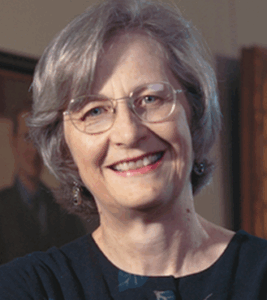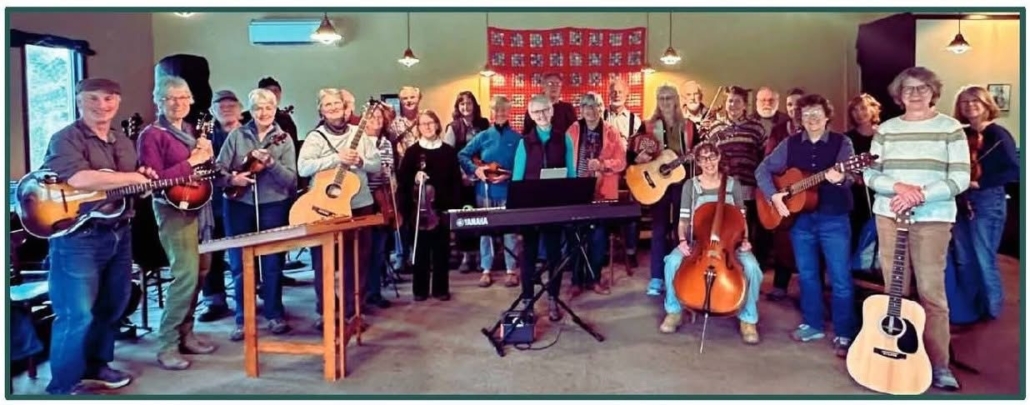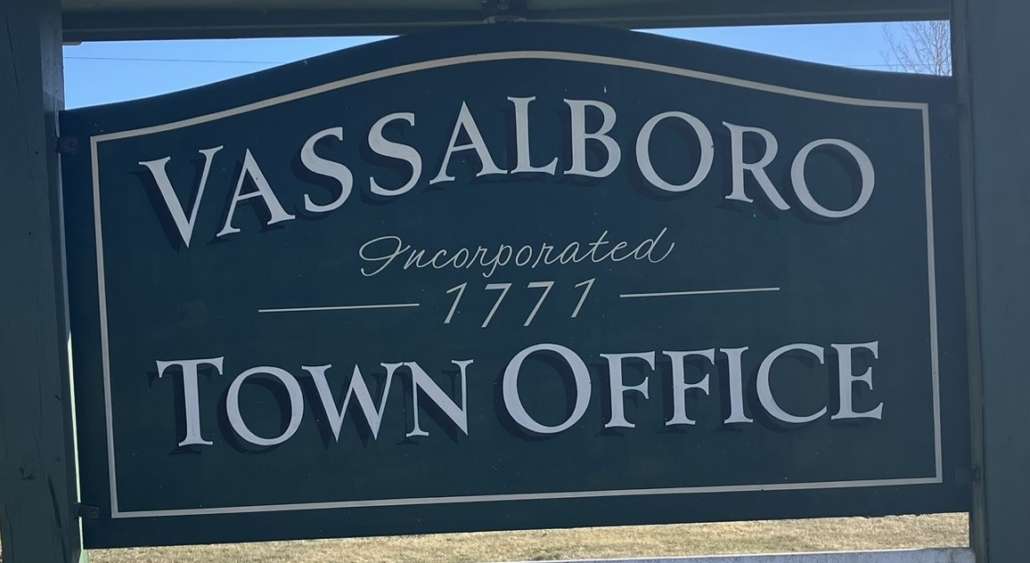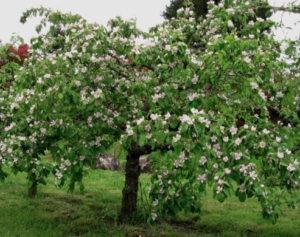Up and Down the Kennebec Valley: Women – Part 3
by Mary Grow
Laurel Thatcher Ulrich’s A Midwife’s Tale focused on women’s lives in the Kennebec Valley around 1800, using midwife Martha Ballard’s diary (from 1785 to 1812) as a main source of information. A consistent emphasis was women banding together to help each other, within families and within the community.
For example, in her description of the Ballard women and girls making cloth (see the Nov. 6 article in this subseries), Ulrich frequently noted how many people were involved. Describing the household in 1788, she mentioned Martha and Ephraim’s two youngest daughters, Hannah and Dolly, still living at home (Hannah was born in August 1769 and married in October 1792; Dolly was born in September 1772 and married in May 1795); nieces, Pamela and Parthenia Barton; and “a succession of hired helpers,” young women from the neighborhood.
Other married women came by to help, and might in return receive some of the products from the Ballard loom. Ulrich added that Martha traded with neighbors for cotton and, when the family had no sheep, wool. “The production of cloth wove a social web.”
Or, as Ulrich later expanded, women were in a “complex web of social and economic exchange” that connected households, creating a “community life” parallel to their menfolks’ political life. Women’s life was based on “a gender division of labor that gave them responsibility for particular tasks, products, and forms of trade.”
At one point, Ulrich compared the women’s textile production and their medical cooperation. She wrote:
“Spinning, like nursing, was a universal female occupation, a ‘domestic’ duty, integrated into a complex system of neighborly exchange. In both realms, training was communal and cumulative, work was cooperative, even though performed in private households, and the products remained in the local economy.”
Martha’s diary gives frequent illustrations of shared nursing, during illness and during childbirth, in the form of references to the presence of other women, relatives or friends or both.
Ulrich analyzed the role of women in healing in an early chapter in A Midwife’s Tale, based on diary entries from the summer of 1787. A “canker rash epidemic” was spreading in the central Kennebec Valley, causing many illnesses and a significant number of deaths, mostly among children. Ulrich said Martha reported five deaths, 15 percent of her cases.
(Canker rash was the name for what Ulrich said now would be called “strep,” or a streptococcal infection; the 1787 epidemic, she said, was scarlet fever.)
In her diary, Martha named four women who were with her and some of her patients. Each, in Ulrich’s analysis, had different skills and a different role.
Hannah Cool was a single woman, apparently an adult, who was living at Martha’s that summer and spent some time at a sick woman’s house, doing unskilled nursing or housework or both. Ulrich surmised her tasks would have included “brewing tea, spooning gruel, and emptying chamber pots.”
Sally Patten Ulrich called “a watcher.” Her main job was to sit with the patient, “offering comfort or conversation” and watching for any changes, especially anything that might indicate a need for treatment.
Tabitha Sewall was the wife of Captain Henry Sewall. They had lost their son to the epidemic earlier, and, Ulrich said, Tabitha was returning the help they had received, not specifically to any current patient, “but to the common fund of neighborliness that sustained families in illness.”
Merriam Pollard, mother of at least seven mostly grown-up children, represented “a group of perhaps ten women who served as general care-givers to the town. A frequent watcher at bedsides and attendant at deliveries, she was particularly skilled in laying out the dead.”
Pollard could do basic medical tasks, and, Ulrich wrote, had once handled a birth when Martha was not available in time.
Ulrich saw these women as examples of the female nursing community, whose members worked together and learned from each other.
Martha’s records of childbirths sometimes include names of other women present. She often called these attendants “her women,” meaning the mother-to-be’s women. Some were family members, some neighbors.
For example, on Oct. 3, 1789, at 11:30 a.m., Mrs. Goff had a daughter (apparently her first, as Martha wrote that the baby was Mr. Goff’s first grandchild). “Her marm [her mother-in-law, “Old Mrs. Goff,” who had come back from Boston the day before?], Mrs Bullin, Mrs Ney were my assistants,” and “Mrs. Jackson,” who had gone home earlier, came back at 1 p.m.
On Oct. 8, Martha stayed with Mrs. Daw or Daws from soon after 8 a.m. until evening, when “shee had her women” and Martha went home for the night. Mrs. Daw’s 11-pound son was born at 6 the next morning, with Martha in attendance.
On Nov. 18, 1793, Martha found Captain Meloy’s “Lady” in labor and had her women called, despite a rainstorm that ended in snow. When a baby girl arrived that evening, “Her attendants were Mrss Cleark, Duttun, Sewall, & myself.” (This was the delivery followed by the “Elligant supper” that was mentioned last week.)
* * * * * *
Over the years, family, temporary help, daytime and overnight visitors came and went in Martha’s house. Martha appreciated household helpers, her own daughters or other young women.
Ulrich saw a “secure supply of household help” (along with being past the age of childbearing herself) as essential for Martha’s career. The more hands at home, the freer she was to spend days and nights away.
Skills like weaving also benefited the younger women, helping them contribute to their present and future families. An alternative to teaching at home, Ulrich wrote, was to send daughters in their teens and early twenties into other households, as Martha’s sister, Dorothy (Moore) Barton did. Martha’s nieces, Clarissa, Pamela and Parthenia, often lived at Martha’s.
A propos of the Bartons, Ulrich mentioned in passing the significance of the sexes of a family’s children. Martha and her husband Stephen, she said, had six daughters “before a son survived”; this imbalance, she wrote, might help explain why they had “difficulty…establishing a farm in Maine.”
The Bartons went back to Oxford, Massachusetts, the family birthplace, in 1788, leaving three daughters in Maine, at least part of the time with Martha. Ulrich wrote that Parthenia (born Aug. 13, 1773) joined Martha’s household on May 26, 1788, and stayed, “with occasional periods away working for other families,” until she married on Nov. 18, 1792, at Martha’s house.
Even after they married and moved to their own homes, daughters might be called on to play a role in the family’s network. A specific example Ulrich mentioned involved Martha and Ephraim’s oldest daughter, Lucy Towne: when she had problems after her fifth child was born, her mother sent her younger sister, Dolly, to Lucy’s Winslow home.
During another period of ill health after a birth, Ulrich said, Martha had Parthenia Barton spend over a month helping at Lucy’s. And when Hannah Pollard, Lucy’s younger (and Dolly’s older) sister gave birth for the first time (probably in October, 1795), “Lucy sent her current helper (her sister-in-law Betsy Barton) to nurse her.”
Men were essential to these female networks: they performed a multitude of tasks, like providing transportation and ploughing gardens, without which their wives and daughters could not do their jobs. Similarly, women provided the meals and clean houses the men needed.
Given the number of children in many marriages, each also answered the other’s physical needs. (Ulrich never mentioned an unwanted baby, even when the mother was unmarried, and no matter how poor the family or how many other children. Without more information, it is impossible to decide whether every child was welcome; or Martha was tactful; or Ulrich chose not to raise the issue.)
Ulrich’s point was that although men’s work has gotten most of the publicity throughout history, women’s work was also vital, and also a group effort.
* * * * * *
Ulrich did not know why Martha Ballard started keeping a daily diary on Jan. 1, 1785. She offered three surmises: “a sense of history or a craving for stability, perhaps only a practical need to keep birth records.”
Whatever the diary’s value to Martha, she kept it faithfully, carrying pages with her when she expected to be gone from home for a few days. Ulrich said there are 9,965 daily entries, over more than 27 years.
Another question is how the diary survived after Martha died in late May 1812.
Ulrich wrote that the diary “probably” was passed to daughter Dolly Lambard’s family, first to Dolly and after she died in 1861 to her daughters, Sarah and Hannah. Sarah Lambard and Hannah (Lambard) Walcott gave the diary to their great-niece, Mary Forrester Hobart (1851 – March 21, 1940), in 1884.
Mary Hobart was 33 and an 1884 graduate of the Women’s Medical College of the New York Infirmary when she received the diary, then “a hopeless pile of loose unconsecutive pages.” Ulrich explained the difficulties women had in entering the medical profession in the 1880s, and the appropriateness of a midwife’s diary coming to a female doctor.
Hobart’s cousin, Lucy Lambard Fessenden, organized the loose pages and “bound them in homemade linen covers” in two volumes, and Hobart “had a mahogany box made” to store them. She “cherished” the diary, which she, her family and her colleagues found worth reading.
In 1930, Hobart, by then almost 80, donated the diary to the Maine State Library. Ulrich gave two motives: a desire to make it more accessible to historians, and concern for its safety “in her wooden house.”
The library promised Hobart a transcript of the diary, but never delivered it. She did eventually receive a copy of Charles Nash’s excerpts, collected for his proposed 1904 history of Augusta (which was finally published in 1961; Ulrich gives credit to Maine State Librarian Edith Hary [1922 – 2013]).
The Maine State Library’s website says Martha Ballard’s diary is in its Special Collections. “Although the original handwritten diaries are extremely fragile and not available for public use, print and microfilm facsimiles can be viewed.”
* * * * * *
The exact date of Martha Ballard’s death is unknown. Her last delivery was at 4:30 a.m., on April 26, 1812; she and “Mrs. Heath” had been waiting since early on April 24.
Martha was not feeling well those days; one or another of her married daughters and daughters-in-law was usually with her. The last diary entry, on May 7, recorded visits by “Daughter Ballard [either Jonathan or Cyrus’s wife] and a Number of her Children,” two other women and Reverend Mr. (Benjamin) Tappin, who “Converst sweetly and mad a prayer adapted to my Case.”
The next relevant diary entry Ulrich found was not by Martha, but by a local male diarist, Henry Sewall. On May 31, he wrote, “Funeral of Mrs. Ballard at Augusta.”
Ulrich found another piece of evidence in the June 6 transfer of responsibility for a cow Ephraim and Martha had been renting (after the one they owned went to pay their taxes in February 1810) from Ephraim to daughter Dolly Lambard’s husband, Barnabas.
The only obituary was apparently a single sentence in the June 9, 1812, issue of The American Advocate: “Died in Augusta, Mrs. Martha, consort of Mr. Ephraim Ballard, aged 77 years.”
Main sources
Ulrich, Laurel Thatcher, A Midwife’s Tale The Life of Martha Ballard, Based on Her Diary, 1785-1812 1990
Websites, miscellaneous.



 An afternoon of live music with the SeaStrings, a local group of friends and neighbors from mid-coast Maine, will be performed on Sunday, December 14, at 2 p.m., at the
An afternoon of live music with the SeaStrings, a local group of friends and neighbors from mid-coast Maine, will be performed on Sunday, December 14, at 2 p.m., at the 







